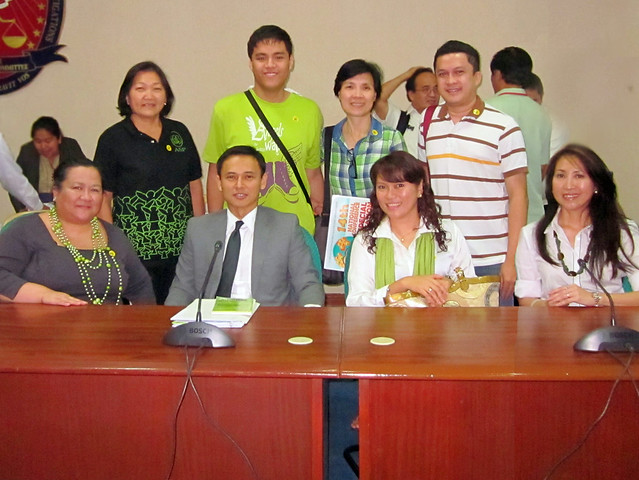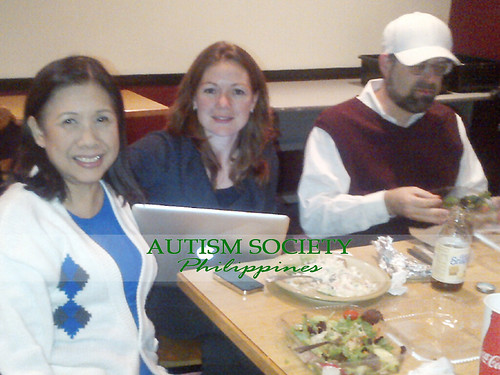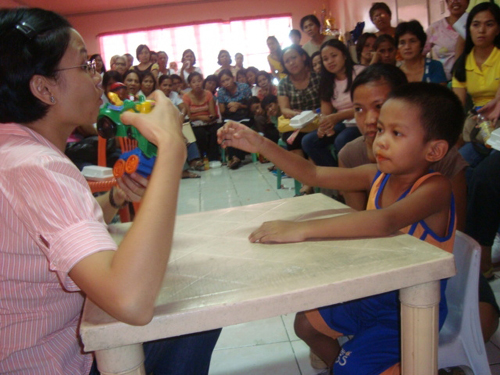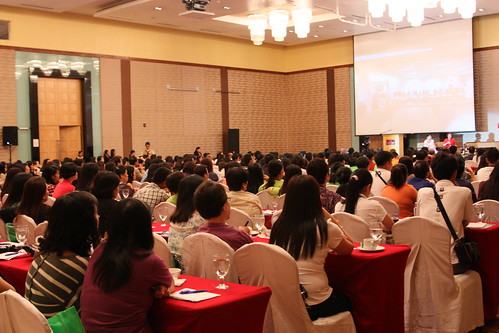By Dang U. Koe, ASP Chair Emeritus
President Aquino ratified into law RA 10627 or the “Anti-Bullying Act of 2013” this month — a celebrated milestone for many children and parents with autism and other disabilities. Beyond what this law addresses is the improvement of the learning environment for our children. We welcome the emerging culture of awareness, inclusion and acceptance in the most basic of our society’s institutions. This month, the Autism Society Philippines was also honored with an invitation to consult with the Senate Committee on Education, Culture and Sports on eight bills currently in the Senate. This move is a reinforcement of special education in the country — a welcome development in our journey as an advocacy group.
 |
With Senator Sonny Angara
and Team ASP |
ASP National Secretary Mona Magno-Veluz, a regular Angels Talk contributor, collaborated with Fortunato Agbayani to bring you this week’s article. Nato is the Chapter president of ASP Project 3 Quezon City and is an active officer of the Quezon City PWD Federation. Our writers looked at the needs of our community and how lawmakers can create laws that will spark societal change. These changes will hopefully matter most in the lives of families affected by physical and developmental disabilities.
For many years, the Philippine disability sector has developed a strong advocacy community that has played a pivotal role in the passage of laws and policies that have made an impact in the lives of PWDs. One glaring area of improvement is the inclusion of the priorities of not just those with physical or mental difficulties, but also those with developmental disabilities that manifest as behavioral, communication and cognitive deficits.
Throughout its 25-year existence, the Autism Society Philippines has attuned its efforts to the concerns of the passionate parents, family members, physicians, educators and allied medical professionals who advocate for the welfare of individuals with autism. Taking our experience with international disability groups, ASP has been an active proponent of the United Nations Convention on the Rights of Persons with Disabilities, which articulates basic principles of equality.
Below are fundamental needs of the autism community that we hope our leaders can consider in engineering laws and policies that will truly be inclusive.
Mandatory developmental screening. A law that requires early childhood developmental assessment will provide the government the necessary statistical data on children with developmental challenges. Our hope is that this can be institutionalized in the same manner as newborn screening for physical and genetic disorders. Beyond screening, children on the spectrum may need specialist intervention, which may not be urgent enough to be life-threatening, but may spell the difference between being a functional member of the community or a burden to it.
Comprehensive needs assessment. Information from the mandatory screening and from the Persons with Disabilities Affairs Offices (PDAO) of PWD registration (for adults) can be a powerful tool for government to outline social maps of the disabled populations — the numbers, their locations, profiles and status. This, in turn, becomes a compass to understand how our leaders can provide the government resources necessary to meet the needs of this marginalized sector. This statistical basis is necessary to track the growth of autism, which US-based advocates have already labeled to be a global epidemic.
Inclusive education. We enjoin our public education sector to open its doors to techniques and principles long espoused by non-traditional schools. Individualized teaching, capability-based placement (as opposed to one based on chronological age) and hybrid programs for adult learners are a few of the developments our community longs to see in the Philippine public education system.
Public servants with special skills. Our public schools require more occupational, speech and behavior modification therapists to meet the needs of children on the spectrum. We need more public hospitals with developmental specialists and physicians. We need transition specialists to develop programs that can help usher in adolescents on the spectrum to either higher education or vocational training or the workplace. It is important for the DOH, DepEd, CHEd and TESDA to co-develop programs that will address the needs of a growing population of children and adults with developmental disabilities.
Community-based rehabilitation. Because of their unique deficits, children with autism require individualized education plans, support in community living, continuous and regular therapy and vocational training. Government-backed programs, coupled with designated public facilities, that can help parents, barangay volunteers and the private sector to supplement the efforts of the SPED educators, will be valuable to enriching the lives of special learners.
Comprehensive sensitivity training for schools and workplaces. There is a need to inculcate programs on disability sensitivity in the bureaucracy for disability sensitivity through government-supported train-the-trainor programs. While gender-sensitivity has been fully integrated in many LGUs and even the private sector, consciousness of the many physical and developmental disabilities remains almost unheard of in many schools and workplaces, hence the prevalence of jokes and derogatory references to PWAs and PWDs.
Creative mechanisms for funding. The parents of the individuals on the spectrum would welcome reforms that will help them fund the interventions for their children. One hundred percent tax-deductibility of intervention expenses of parents for their children with disabilities, Philhealth-supported therapy, interventions included in HMO coverage are only some of the creative solutions our sector would like our leaders to champion.
DIWA Party List Representative and autism sibling Emmeline Aglipay, will speak on “Autism and the Law” at the 13th Philippine National Autism Conference on October 26 and 27. Themed “Hope for ‘A’ Nation,” the confab will tackle issues and experiences relevant to an autism community that is striving for acceptance and inclusion in Philippine mainstream society.
The event is designed to provide information on developments relevant to allied medical professionals, social servants and community workers who work with autism. Most importantly, the event was created for the growing community of parents, family members and individuals on the autism spectrum who are seeking answers, quality support and fellowship. For more details, visit http://bit.ly/philnac2013.a
This article appeared on 23 September 2013 in the print and on-line versions of Manila Bulletin's "Angels Talk" under the by-line of Dang U. Koe, ASP Chair Emeritus.






 Posted in:
Posted in: 








